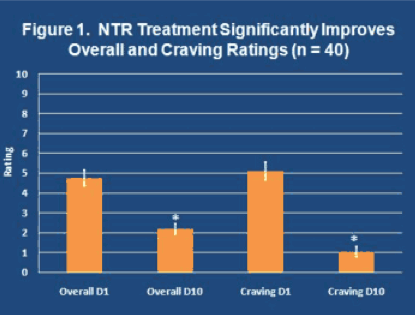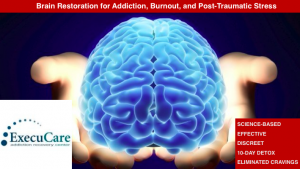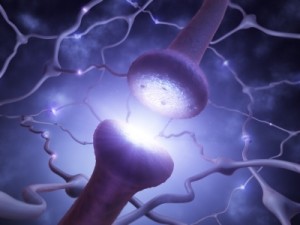By ExecuCare Team on July 30, 2013 /
NTR /
Comments Off on Neurotransmitter Restoration Therapy for the Treatment of Substance Abuse
Neurotransmitter Restoration Therapy for the Treatment of Substance Abuse
Authors
S. Owen, M.D., P. Norris, M.Ed., LPC, DAPA, S. Broom Gibson, Ph.D., R. Mestayer, M.D.
Introduction
This study, which was presented at the Society for Neuroscience, evaluated the effectiveness of using Neurotransmitter Restoration (NTR) for the treatment of substance abuse. Previous research had shown the negative effect substance abuse has on the brain (particularly, neurotransmitter receptor dysregulation). NTR aims to rebalance neurotransmitter function in the brain, alleviating physiological and psychological withdrawal symptoms.
Method
The study consisted of 40 patients, male and female, with substance abuse problems including opiates, psychostimulants, benzodiazepines, marijuana and alcohol. Data was collected on day 1 (prior to initial NTR treatment), during the 10-day NTR protocol, and the ten days after NTR was administered. On a scale of 1-10, patients rated: overall affect, cravings, negative affect, stress levels, and reward (potential for abuse of treatment).
Results
The study found that NTR significantly reduces cravings, stress, depression and anxiety, and improves overall well-being. The research also found that NTR shows no indication for potential abuse.

NTR Treatment Found to Significantly Improve Overall and Craving Ratings

NTR Treatment Found to Significantly Reduce Stress, Depression and Anxiety Ratings

NTR Treatment Does Not Show Abuse Potential
 Congratulations to ExecuCare’s Executive Director, Dr. Jacquie Damgaard! Thanks to the votes of our dedicated clientele, colleagues, friends and Facebook fans, Dr. Damgaard has won in the category of Best Life Coach for Best Self Atlanta magazine’s “Best of 2014” Contest. Dr. Damgaard’s innovative coaching program in combination with our unique NTR Brain Restoration is having amazing results in freeing clients from the chains of addiction, chronic stress/burnout, PTSD and chronic pain. Read more →
Congratulations to ExecuCare’s Executive Director, Dr. Jacquie Damgaard! Thanks to the votes of our dedicated clientele, colleagues, friends and Facebook fans, Dr. Damgaard has won in the category of Best Life Coach for Best Self Atlanta magazine’s “Best of 2014” Contest. Dr. Damgaard’s innovative coaching program in combination with our unique NTR Brain Restoration is having amazing results in freeing clients from the chains of addiction, chronic stress/burnout, PTSD and chronic pain. Read more → We are excited about our ExecuCare free CEU Seminar,
We are excited about our ExecuCare free CEU Seminar, 







